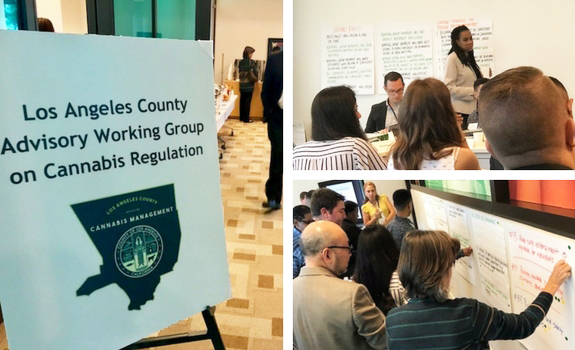The County of Los Angeles has made public input a priority as it grapples with the complicated and historic work of developing regulations for newly legalized cannabis in the unincorporated areas of the county.
As part of this process, the county’s Office of Cannabis Management turned to Community Partners for help with planning and facilitation as it convenes an Advisory Working Group and begins holding a series of 18 community listening sessions in all five Supervisorial Districts, at locations from Calabasas to West Covina, and from Antelope Valley to South Whittier. The recommendations and input we help gather from both engagement activities will help inform County staff and the Board of Supervisors as they set regulations and policies for this emerging new sector in the region.
The Advisory Working Group includes academics, a cannabis attorney, a local mayor, a neighborhood council member and cannabis industry representatives, along with a variety of drug policy experts. A list of working group members and meeting dates is here. They’ll meet eight times between June and August and develop recommendations that are expected to provide guidance to County policymakers, and may be helpful to cities and other counties throughout California who are currently studying best practices for cannabis regulation.
While these meetings are open to the public, it is the listening sessions that offer an opportunity for community members to learn more about key issues and weigh in on such topics as where commercial businesses can be located, strategies to help prevent youth from consuming cannabis, public safety, and more.
For a list of listening sessions, visit the Office of Cannabis Management website.
We’re honored and excited to be a part of this precedent-setting work with the County, which fits well within our role as an intermediary deeply connected to the civic culture of Los Angeles. Community Partners previously assisted the County Department of Public Health as it managed a community feedback process regarding a re-organization and consolidation of several health agencies. Additional work with the County Department of Public Health includes trainings and field exercises to increase Zika preparedness, and partnerships with community organizations to develop emergency preparedness measures that support LGBTQ people of color.
Next Post
Witness LA Honored
July 10, 2017
Join our mailing list!
Keep up on the latest from Community Partners—our partnerships, learnings, grant opportunities, resources and more.




